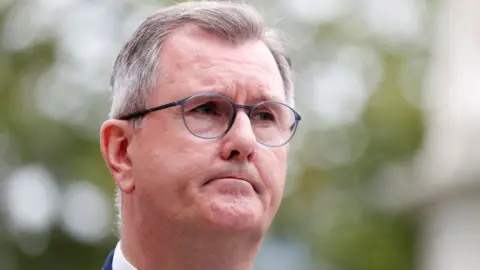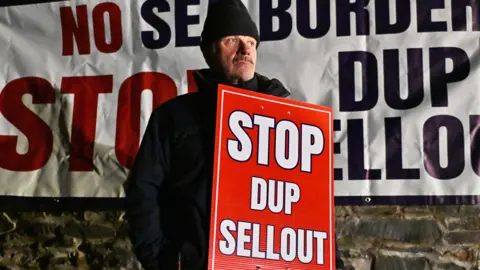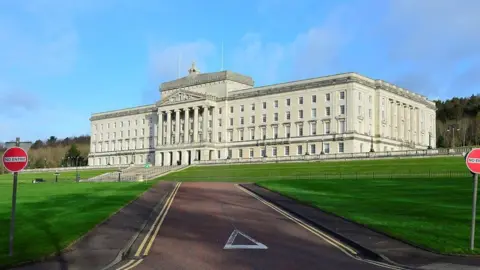Can Sir Jeffrey Donaldson sell the DUP's deal with the government to unionists?
 PA Media
PA MediaThere is one question Sir Jeffrey Donaldson won't be able to escape now his deal with the government is finally laid bare.
It is the question he will be ready for, but will struggle to answer in any convincing way.
If he can't sell his deal to many of his MPs, MLAs and lords, how is he going to sell it to the wider unionist electorate?
It is now clear he wasn't able to convince almost half of his party officer team.
Judging by what was said at the executive meeting this week, the officer split remained seven to five.
Lord Dodds, Sammy Wilson and Carla Lockhart are among those within the party who spoke out against the deal.
Edwin Poots supported the deal, which proved crucial in tipping the balance for the party leader. Executive members were also divided, but we may never know the true extent of the split.
They cast their votes in a secret ballot and only a small number of party officers know the result.
Although Sir Jeffrey said he had received a decisive endorsement, he didn't explicitly say the vote was decisive. If it was he would have said, his critics might say.
But what is clear is that Sir Jeffrey has the majority of party officers and executive members in his corner, however slim the margin.
That means those opposed to the deal have lost the key fight and the party has now moved on.
First impressions matter
The battle to convince those outside the party began on Tuesday and Sir Jeffrey had a free run to get his message across.
In a clear strategic move, publication of the deal was held back for a day to allow the DUP leader to talk up his wins free from any challenge.
It allowed him to stay on the front foot as he toured the TV and radio studios.
It also meant his political opponents had no real ammunition to fire at the DUP leader and crucially when it comes to selling, first impressions matter.
The DUP will hope that many unionists had already made up their minds before the heavy detail of the deal landed.
 Getty Images
Getty ImagesOthers, like the Loyalist Communities Council (LCC), will wait to see the small print.
The group was briefed by Sir Jeffrey on Tuesday night and afterwards said it would study the government's command paper before passing its verdict.
An endorsement from the LCC could be key if Sir Jeffrey is to win over wider loyalist support; even more crucial will be the support of the Orange Order.
Its leadership has been fully behind Sir Jeffrey so far, but will that change once the deal is fully digested by the brethren?
But the sales pitch from Sir Jeffrey goes beyond what he has negotiated with the government.
For him, devolution is the only way to protect the future of the union and unionists should take that on board before judging his deal.
 Pacemaker
PacemakerIt is also clear that the DUP leader views the agreement as the start of a process and not the end, which is evident from the language he is now using.
He said the party had "made progress on the seven tests" in the agreement, which suggests there is more progress to be made.
He also talked about "banking" the gains already won in the hope then of getting more.
This was the same language used by former DUP leader Peter Robinson when he urged the party to continue the fight against the protocol inside Stormont.
That is clearly now the direction of travel for the current DUP leadership.
